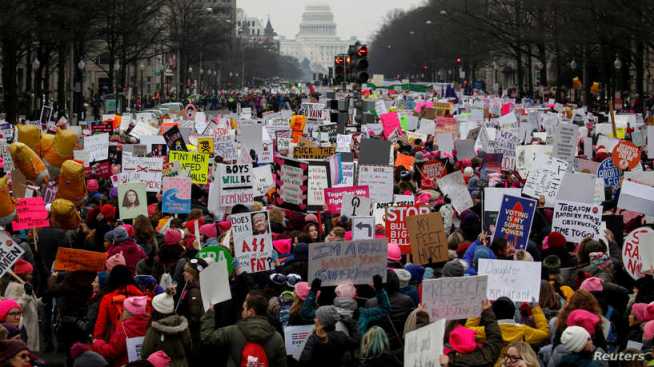
Thousands of people participate in the Third Annual Women’s March at Freedom Plaza in Washington, U.S., January 19, 2019. REUTERS/Joshua Roberts TEMPLATE OUT – RC1F14C6BEE0
Thousands of Women Gather in US for 4th Annual Women’s March
By VOA News
Thousands of women began marching Saturday in cities across the United States for the fourth annual Women’s March to advocate for a host of issues, including gender equality and women’s human rights.
Rallies got underway in dozens of cities, including Washington, where the first Women’s March in 2017 drew hundreds of thousands of people the day after President Donald Trump was sworn into office.
The march has included a political message since it began three years ago when many protesters wore the knitted pink hats that have become a symbol of women’s anti-Trump sentiments.
Politics continued to be a strong theme at the Women’s March in all subsequent years, including in 2018 when the organizers moved the march to Nevada, a battleground state for the midterm elections that year, as well as in 2019 when the march returned to Washington and heralded the record 102 women who had been recently elected to the House of Representatives.
Several of the Democratic candidates for president in 2020 said they planned to attend Women’s March events across the country this year. Pete Buttigieg, the former mayor of South Bend, Indiana, will attend the Women’s March in Reno, Nevada, while former Massachusetts Governor Deval Patrick is planning to be at a rally in South Carolina. Senator Michael Bennet and businessman Andrew Yang will attend Women’s March events in New Hampshire and Iowa, respectively.
Since its first march, the Women’s March has faced controversy, including its leaders facing accusations of anti-Semitism. The organizers have repeatedly denied the claims. Three of the four original co-chairs of the organization have left the group, and the organization has appointed a new board that includes three Jewish women.
Current co-president of the Women’s March, Isa Noyola, noted in a statement ahead of this year’s march that it will be the last march before the 2020 election.“
In 2020, we have a chance to finish what we started three years ago and remove Trump from office,” she said.

